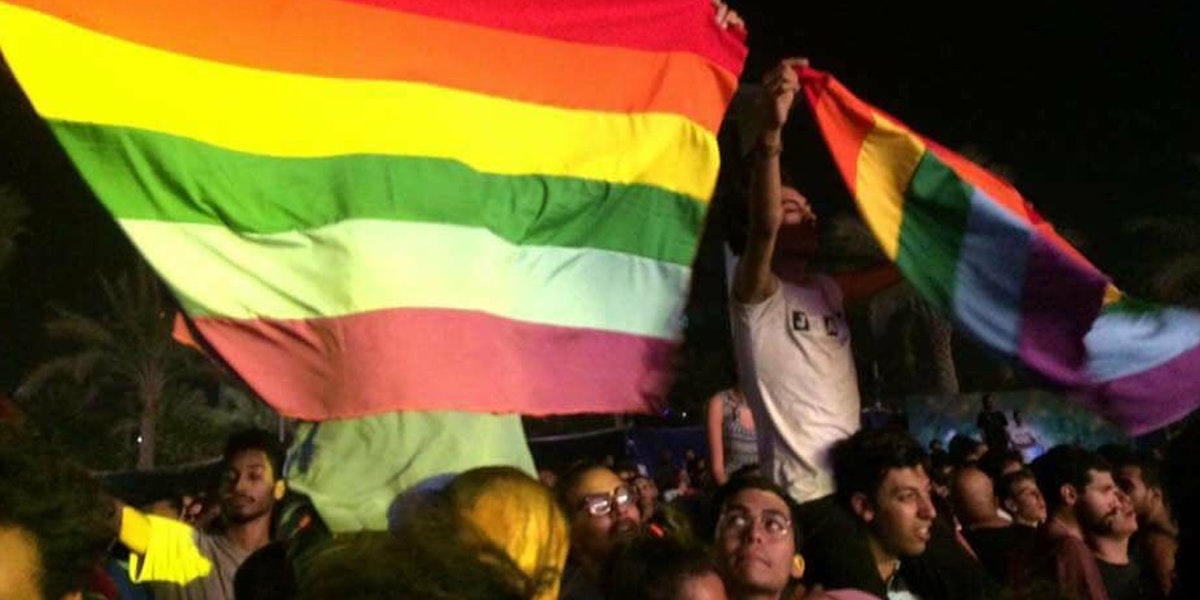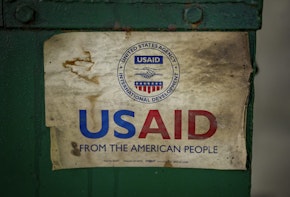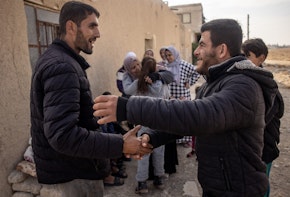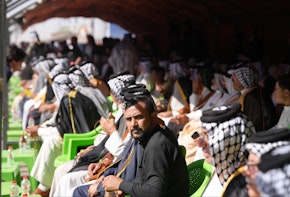Ahmed El Hady has written and lobbied extensively on behalf of the Egyptian LGBTQ community, both at home and abroad. He is especially interested in creating a safer environment for LGBTQ Egyptians and framing their political aspirations as an integral part of the struggle for freedom in Egypt. Any discussion of rights, he argues, must incorporate LGBTQ rights. When Egypt’s popular uprising broke out in January 2011, El Hady took a leave from his PhD program at the Max Planck Institute for Dynamics and Self Organization in Germany to participate in the revolution. He eventually completed his studies and now works at Princeton University, where he does pioneering research on closed-loop methodologies in neuroscience. He edited the first-ever reference work on the subject and innovated novel approaches to studying the brain. However, El Hady remains active in LGBTQ issues and continues to write and lobby extensively on behalf of the Egyptian LGBTQ community. El Hady talked with Thanassis Cambanis at The Century Foundation in December 2018 about LGBTQ rights in Egypt and the wider world.
Thanassis Cambanis: What is the state of the LGBTQ community in Egypt right now?
Ahmed El Hady: We are experiencing a crisis of existence and survival. We are being killed, put in prison, committing suicide. In 2018, we had 122 LGBTQ-identifying individuals arrested in Egypt, and that’s just the known figure. Arrests take place not only through online entrapment, but also on the streets. If the authorities see someone effeminate, that’s a potential target. This is because they want to play on the performance aspect of social control. If you are not performing your masculinity, you run the risk of being arrested. When people are arrested, rape and anal examinations are carried out—which is also a form of rape, of course. Detention is arbitrary and there are also forced disappearances. In 2017, a lawmaker even tried to create a new crime called “promoting homosexuality.” The law was struck down, probably because of U.S. pressure. But even though there are no laws that explicitly criminalize homosexuality, they use the existing debauchery laws in order to criminalize it.
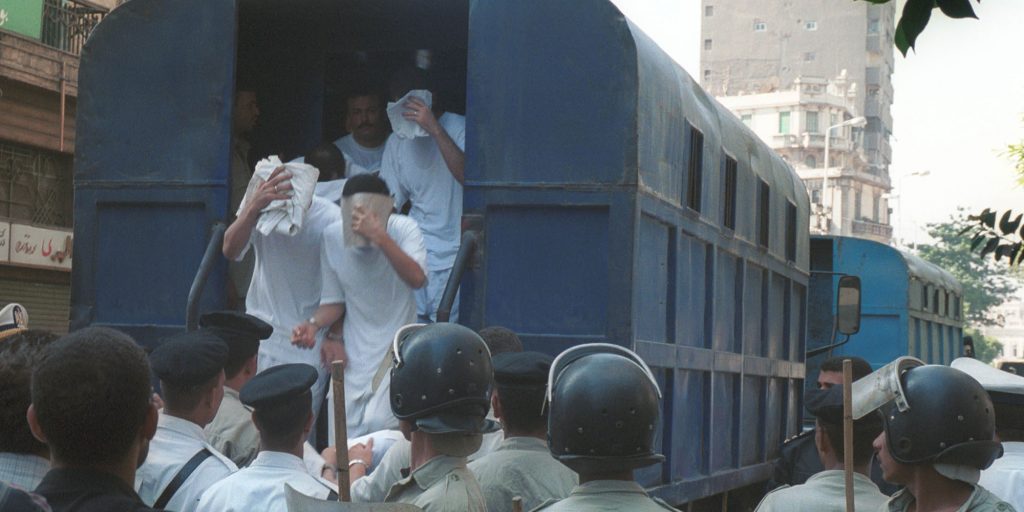
Also, if you are HIV-positive and go to a government hospital, they can report you to the government and you can find the police at your door. They enclose you in a hospital or they harass you—it depends on how lucky you are and your connections. HIV/AIDS is a silent epidemic that is killing people, because there is also no appropriate sexual education. The state is not acting on it. And the response from the state is always, “we have our own cultural context, please do not criticize us.” This is what the Ministry of Foreign Affairs does every time the U.S. government or the European Union sends a letter criticizing Egypt on its practices.
We are experiencing a crisis of existence and survival.
Cambanis: Do people who are persecuted for being LGBTQ end up in prison for years like the political activists?
El Hady: It depends on how lucky you are—your lawyers, the judge, the police officers. Some stay for six years, some are released earlier. But many who are released end up committing suicide. The first thing that they do when you are arrested is to call your family. It’s on your record, so no one is going to employ you. Even the results of your anal examinations are recorded. Sometimes I feel some of them wished they were still in prison. In the bathhouse case, one of the men burnt himself after he was released.1
Cycles of Repression
Cambanis: Does this regime cynically drum up fear around LGBTQ rights in order to mobilize public support, or does it see some real challenge to its legitimacy from the existence of LGBTQ people?
El Hady: Since the coup of 2013, Egyptian president Abdel Fattah el-Sisi has had a problem of legitimacy. He lost a lot of support from the more religious and Islamist base, and the persecution of the LGBTQ community is a way to reassert his credentials. And it is largely working. For example, the Orthodox Coptic Church organized a conference called “Volcano of Homosexuality,” following the Mashrou’ Leila concert in 2017, when concertgoers unfurled a rainbow flag. The church adopted a national security narrative, arguing that they face this common threat and “we have to forget our differences and unite against it.” Despite all that is happening to Copts under Sisi, they managed to unite with him against this “enemy.” So when these moments come, Sisi is basically in agreement with the Islamists and the Coptic Church.
Cambanis: During Mohamed Morsi’s years as president, did they not have any time to bother LGTBQ people?
El Hady: No arrests. We were living our lives. This was the best time to meet up and apps were not monitored. Sure, they may not have had enough time—maybe if they had stayed in power for longer, this would have happened. But during the short time Morsi stayed in power, there was nothing on this front.
Cambanis: During the end of the Mubarak years, from 2009 and even into 2012, after he was deposed, there was a sense that it was safe for the LGBTQ community. Is this correct?
El Hady: Yes, but there has always been a class element to it. I interacted across classes in Egypt, and there is a protected class, which usually encompasses the bourgeoisie, the upper middle class, and foreigners. There were some areas that the police would not enter and snoop around or make arrests in. But arrests were happening elsewhere, like in the 2014 case of the raid on the bathhouse, which is located in a working class neighborhood. Unsurprisingly, the queer bourgeoisie were silent. Many of them are in fact Sisi supporters. But I think after the incidents following the Mashrou’ Leila concert, they are beginning to realize that they are not safe anymore.
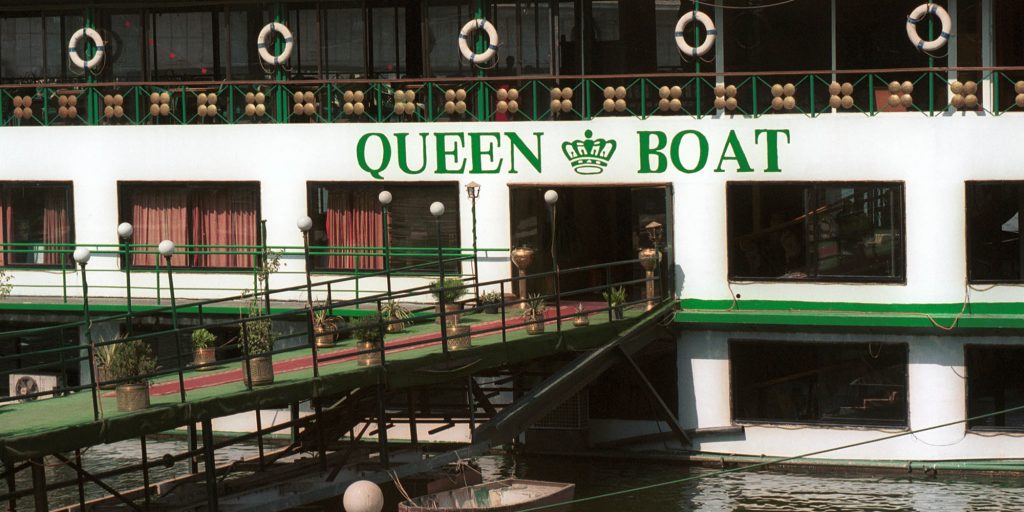
Cambanis: Can you tell us about what happened at the Mashrou’ Leila concert and why people were arrested? What was the public reaction?
El Hady: In September 2017, almost thirty thousand people attended a Mashrou’ Leila concert. It was not the first time that Hamed Sinno performed live in Egypt.2 But during this concert, there were a lot of LGBTQ-identifying individuals, and the environment was generally comfortable and relaxed. Some very excited people decided to raise the rainbow flag during the concert and there were photos taken of it.
The concert passed, but the next day on social media, these pictures went viral. Even TV presenters began to decry the pictures and began speaking about the degradation of public morality in the country. A whole moral panic ensued for three weeks. Funnily enough, at the same time, the pro-Islamist and pro-Sisi social media essentially converged around this event and spoke in the same language: What’s happening to the country? Where are the police? What’s happening to our morality?
Cambanis: What was the shape and narrative of the moral panic?
El Hady: The narrative, is what I call, in my own terms, the Massadist narrative.3 It refers to the rhetoric that the call for gay rights indicates the existence of a potential “Western” conspiracy against the state. According to this narrative, the West is infiltrating Egypt through gay individuals and networks and, therefore, the state has a duty to protect society from the threat. This was the narrative. What was very painful was that there were members of the gay community who basically adopted this narrative as well. They would say, “Why did you raise the flag? Don’t you realize that ‘coming out’ is a Western practice? We were living our lives, why did you have to declare yourselves gay?” So there were two fights: there was one happening at the level of Egyptian society, and another one taking place within the gay community with a lot of them turning against those who raised the flag.
Cambanis: In terms of the external narrative, why did the state demonize homosexuality?
El Hady: The state was very quick to adopt this as a counter-revolutionary tool. “This is what the revolution brought onto us,” they would argue. January 25 almost immediately came into the narrative. Since the coup of 2013 took place—but even before, in 2012—the state was always talking about what happened at Tahrir Square in terms of sexual deviance, perversion, et cetera. This “sexuality” dimension has always complimented the counter-revolutionary rhetoric that Sisi adopted. Obviously the regime didn’t care about heterosexual rape because it wanted to assert its masculine, patriarchal authority. However, for the state, sexual “deviance” and “perversion” destroy and undermine the whole social fabric.
Obviously the regime didn’t care about heterosexual rape because it wanted to assert its masculine, patriarchal authority. However, for the state, sexual “deviance” and “perversion” destroy and undermine the whole social fabric.
Cambanis: So sexual violence is not destabilizing, but gay relationships or non-heteronormative sex is?
El Hady: Exactly. That’s in line with what they see as the predominant form of sexuality and the way society functions. This is how they can gain control over society.
Policing Sexuality
Cambanis: Repressive governments all over the world target people who they consider sexually deviant as a way to keep the wider population in line. Ultimately, authoritarian regimes police sex and sexual identity because doing so is a cornerstone of social control.
El Hady: Right. The body becomes the battlefield. It’s biopolitical power. They really want to shape the body, and in China I think they want to even genetically engineer the body—that’s a whole other level of authoritarianism. I think there were reports during the Bolshevik times of biologists sent to West Africa to carry out artificial insemination of chimpanzees. They went as far as they could in genetically engineering people in order to control the body. It’s not only sexuality, the whole body performance has to be under surveillance and framed through the different control channels that authoritarian governments use.
Cambanis: In states like Syria and Egypt, which claim to be secular modern states that stand against sharia and Islamic takeover, authoritarian governments are unbelievably repressive. From a Western perspective, we should find this as abhorrent as the religious police in Saudi Arabia, right?
El Hady: Yes, of course. This goes back to the historical inception of these modern states as anti-colonial, like the Nasserist tradition in Egypt and Ba’athism in Syria. The “anti-colonial” rhetoric has been used to advance a repressive agenda in the name of defending the society from Western ideas such as democracy and human rights. What we are seeing nowadays is a continuation of governing the state with this type of anti-imperialist rhetoric. In Syria just as in Egypt, they are reenacting repression in the name of protecting the state from foreign enemies. The enemies change over time, of course.
Cambanis: So the identity glue is hypernationalism but it’s also a kind of masculinity?
El Hady: Sure, hypernationalism and hyper-masculinity because the dominant rhetoric is that the military is trying to reassemble the lost masculine identity. It’s almost sexual. Whenever you have a uniform, people talk about it in sexual terms. This has persisted since Nasser, being governed by the military, the overarching and ultimate power.
Cambanis: I also think what has been very well documented and traced is that it is a public performance. It isn’t a quiet crackdown. When the state goes into a bathhouse and arrests a bunch of gay people, it’s broadcasted for weeks and weeks.
El Hady: Yes, but it’s not just the state itself. They have their arms everywhere—the media and social media, for example. Sisi won’t himself come out and say that he’s fighting the gays. No, it’s all done through the media. The case of Mashrou’ Leila was so publicly amplified. You saw it on so many TV channels, on social media, on printed newspapers. It was a whole public campaign of demonization. It’s also a rallying cause because Sisi is failing in so many other ways.
Cambanis: Is the state also targeting transgender people?
El Hady: What the government is doing against transgender people is arresting them for sex work. When foreign governments asks about arrests, they tell them they are sex workers because this sort of work is criminalized in Egypt. Transgender people mostly cannot get work, so many of them have to become sex workers anyway to sustain their lives, which puts them in even more danger to be bullied or killed. The police state commonly fabricates charges of sex work as a way of controlling people. If international diplomats complain about the detention of someone, the Egyptian police state can say, “We’re just dealing with prostitution.” Even within the gay community, there is terrible transphobia. But there are groups working on these issues, like Transat,4 which is a platform of trans and/or non-binary gender activists and dissidents from the region.
Cambanis: So there are “acceptable” gays, and they won’t make common cause with transgender people?
El Hady: Yes. There are even feminists who have problems with transgender people. So transgender people have a very hard time. They also have to get permission from Al-Azhar in order to transition.5
Cambanis: Does Al-Azhar give it?
El Hady: For a long time they kept discussing it, but they do give it. The decision derives from their interpretation of religious law that “men are men and women are women.” So it’s okay to switch, but you can’t be in the middle. Challenging the binary is very threatening.
The Response of the Left
Cambanis: Can you tell us about the response of the Egyptian left and secular activists to this repression and detention of LGBTQ communities?
El Hady: In terms of the Mashrou’ Leila concert, the response from the left was scandalous. There were very few groups that responded positively. The Revolutionary Socialists and the Egyptian Initiative for Personal Rights (EIPR) were the only two institutions to issue statements in solidarity.6 In other leftist parties, there were internal struggles over these issues, but they were afraid of publicly supporting homosexuals because they feared they would be called “khawalat.”7 This is where their true colors came to the fore. For a lot of Islamists who pretend to be on the left, when it comes to moral issues like homosexuality, there is no solidarity. It created a whole problem within leftist parties who began realizing that they were supporting jailed Islamists but not homosexuals.
Cambanis: So a secular activist would be willing to speak out against the detaining of an extremist Islamist who doesn’t even recognize secular rights, but they wouldn’t defend a gay person being persecuted? Why is that?
El Hady: My personal interpretation is that leftist parties have the delusion that they have a popular base within the society. They want to enact change very gradually and they do not want to engage in a direct confrontation with society, because supporting gay rights would amount to such a confrontation. So there is definitely an element of fear. The scaffold of society is Islam and people cannot really go beyond this, even secularists. Only a few known activists, such as Nawal El Saadawi, were willing to challenge sharia. But in general, the left does not bring Islam up in strong terms, nor defend personal rights. It was very disappointing.
There are many activists who are closeted gays, but refuse to “come out” because of their fear that it will be used by “Western” media to undermine popular uprisings.
This is a problem that we have in the region as a whole. There are many activists who are closeted gays, but refuse to “come out” because of their fear that it will be used by “Western” media to undermine popular uprisings. There is a priority game that I find disgusting. Some leftists say, “we have to first resolve class antagonism, then we can look at gays.” No, that is not an option. These people are under threat from the state. Previously, it was the morality police that were “taking care” of gays, but now it is El Amn El Watani (the National Security Agency). The security services now regard us as “foreign agents” trying to infiltrate the state. They also realized that there are many people recently escaping from the country, and I’m sure they are preparing for a moment where they can say, “we caught the networks that are trying to infiltrate the state.” They really want to frame it as a national security issue. It’s not even about morality anymore. I think now it’s even going into the intelligence sphere, which is a very horrific turn, because they have very advanced surveillance capabilities, the ability to detain people indefinitely, and put people on military trial. Imagine homosexuals being chased as conspirators against the state for the mere reason that they are having sex.
Cambanis: Under such repressive conditions, it’s especially risky to publicly advocate for LGBTQ rights.
El Hady: That brings us back to the other point I was discussing regarding the internal discussions within the gay community following the Mashrou’ Leila concert. I am a person who believes that we have to enter into a full-blown confrontation with the state. In the United States what worked was the act of massive coming out. People have to enter into a direct confrontation with both the state and society and demand equal, civil rights. The existing mantra tells us to delay this process until there is an opening. I don’t buy it. We are dying anyways.
Rights and Tactics
Cambanis: Is there a self-defined gay community? What are the different views of what rights people should have and on what basis?
El Hady: Yes, and I would classify it into four main groups. First, there is the gay bourgeoisie. They are totally dissociated from all of this. They have money to travel to Pride, to have their own parties, and it’s a very enclosed community. They will only mobilize once their economic privileges are under threat. Some of them help when needed, but the majority of them really don’t care about rights. Second is the gay working class, and this is where there is some community forming. Mostly, it’s helping people who get thrown out of their homes, providing shelter, supporting each other. The third is the human rights organizations, such as Bedayaa and Mesahat, which are LGBTQ organizations. They represent the LGBTQ community abroad, try to secure funding, and help people either travel or try to establish HIV clinics in order to get tested. The fourth is the self-hating gays who will work against the issue whenever there is visibility. I am most interested in the second and third groups—the working class and human rights organizations. I think this is where there is a real, viable community being formed. You need this community to begin building solidarity with other human rights groups against state repression.
Cambanis: And which of these groups take the position of advocating for basic, universal rights?
El Hady: Human rights organizations definitely take this position, but the debate is about how we get there. How much of a confrontation with society do we want to enter into? How much foreign pressure do we want to apply on the government?
Cambanis: But these are questions of tactics. Before you get to the tactics, you have the underlying philosophical question of basic, universal rights. I think that today’s Arab world is extremely regressive in its view of what counts as identity and where rights reside. Currently, rights are a gift from the ruler and the identities you are allowed to have are religious, and in some places, nationalist.
El Hady: Correct. In Egypt, all the human rights organizations and activists agree that we must contextualize gay rights within the January 25 revolution. There was this outburst of social unrest and there was an appeal to social justice and freedom. This is the rhetoric within the Egyptian sphere. And this is an appeal to universal, human rights that do not come from the ruler at all.
Cambanis: I didn’t see a lot of robust universalizing among the people in Tahrir. Among the core group of activists, there were lots of secular activists, gay people, atheists, cosmopolitans—people outside the established lanes of identity. But for the most part, their approach was to be very discreet about their identities.
El Hady: I agree with you, but something is happening with the benefit of hindsight. During Tahrir, there was an attempt to be discreet in order to pass messages of universal rights slowly and gradually. But I think now, reflecting on Tahrir, these very same activists are realizing that there are no other viable options other than confrontation. This is happening because the gradualist tactic did not work and continues not to work. In terms of human rights, the narrative is becoming more radicalized than during Tahrir.
Cambanis: Is that happening in exile?
El Hady: It’s happening both in exile and in some human rights organizations in Egypt.
Cambanis: How much transnational and regional solidarity work or interaction is happening between people fighting for gay rights in Egypt and other Arab countries?
El Hady: Lebanon is considered the hub for exiled gays in the Arab world. That’s the one type of transnational solidarity. But I fear that because we are in a state of permanent crisis, there is no time for even thinking about what to do next.
Universal Rights
Cambanis: One of the ways in which the questions of LGBTQ community, rights, and identity comes up a lot in this project is through other types of rights activists. Whether they are activists for religious freedoms or Syrian leftists, there are a whole group of people who end up making the argument that their counter-narrative to the regime’s narrative of rights is too tenuous to make room for something as radical or unpopular as gay rights. “But if you follow our prescription, you wouldn’t need gay rights anyway.”
El Hady: This is the same reaction that happened after the Mashrou’ Leila concert. Most of the leftist groups didn’t see a space for us and thought it was too confrontational. We see this recurring day after day. But since the concert and the events that ensued, there has been a lot of discussion within the Egyptian left on how to create a space for gay rights. Feminists in Egypt, for example, have been a long-standing ally. Many of the LGBTQ activists worked under the umbrella of feminist movements. There was a natural alliance between radical feminists and the LGBTQ community, and we could work under their umbrella without openly saying we were LGBTQ.
Since the concert and the events that ensued, there has been a lot of discussion within the Egyptian left on how to create a space for gay rights. Feminists in Egypt, for example, have been a long-standing ally.
Cambanis: I would argue that any reform or other movement that purports to be about rights but that doesn’t make room for women’s rights, gay rights, and transgender rights is more or less doomed to replicate the authoritarianism of the existing regime. Even if you end up with a reformist or revolutionary government that is better than the current ones in Egypt and Syria, you’re going to end up in the same place today if you haven’t reoriented and said rights are for anyone who wants them.
El Hady: I agree with you. If you wants rights, rights are for all. You cannot exclude, because it is the beginning of exclusion of many more to come. I believe we need a radical confrontation with society and anything less than full rights for LGBTQ people and women is unacceptable.
Cambanis: And should we understand state violence against LGBTQ people as a canary in the coalmine for rights in general? As Scott Long argues, by keeping sexually marginalized populations vulnerable, it reminds society at large that anybody can be next.
El Hady: Sure, I see it in two ways. First of all, they are easy prey. There is no one in solidarity with them, so it’s a form of state violence glorified and even celebrated by society. In many ways, a lot of people do not notice the kind of complicity they are being involved in while participating in these demonization campaigns against sexually marginalized populations. In other words, when it comes to what the state calls “deviants” or “perverts,” state violence is in solidarity with the society at large—which might sound counterintuitive since many groups who would otherwise oppose state terror would ally with the regime. This is the type of violence that no one will care about. Incidentally, some revolutionaries believe that this sort of violence is “legitimate” because it is line with the norms and values of society, which I find particularly terrifying. On the other hand, this violence is a reminder that the state can attack your son, your daughter, whomever it wants. But I’m not sure people really care. I am more pessimistic than Scott here. I feel that this type of violence will be seen as legitimate by a large number of people. When it came to women’s rights in Egypt, virginity tests passed unnoticed. Women and LGBTQ people are always the sacralized victims by which the state can declare its moral authority. But again, here you see the asymmetry in response to violence against Islamists. If Islamists are attacked, anti-regime activists will immediately go out in solidarity. But nothing happens when these other groups are attacked. This gives you an idea of who is worthy of being considered a “victim.” In harsh terms, in the view of many, we need to be eliminated.
Cambanis: How does this compare to other Arab countries’ approach to gay people, gay rights, sexuality, and sexual communities?
El Hady: I will begin with some of the positive places. Lebanon seems to be progressing well. I was just at the OutSummit here in New York, which is a meeting for global LGBTQ people. Lebanese activists were there openly, whereas Egyptian activists were much more scared and did not want to be recorded or photographed. In Lebanon, the state is pushing back of course, but it’s not an existential threat. In Tunisia, there is amazing work being done. There are organizations that are working openly. In Egypt, all the organizations are underground, they can’t be registered, and they’re trying to help people through their own networks. They mostly help people survive, provide lawyers, and establish clinics. In the Gulf, you cannot even talk about these issues at all.
Professional Activism
Cambanis: So you’re not a professional rights activist. You’re a neuroscientist. What has been your trajectory?
El Hady: My trajectory began with the revolution in 2011. I was doing my PhD in Germany at the time. I took an indefinite vacation when it began and participated in it. Amazingly, on January 28, the state was collapsing. But unfortunately, people didn’t go far enough. And then I went back, but my issue was always advocating for LGBTQ and women’s rights. I was involved in establishing the Egyptian Women’s Union and I was very close to Nawal El Saadawi. But I left the group because they weren’t openly supportive of LGBTQ rights and my political agenda did not align with theirs.
Also, it has become obvious to me that many of them, including Nawal El Saadawi, are unfortunately Sisi supporters either directly or indirectly. Right now my involvement has been helping people escape the country when needed. When the situation escalated with Mashrou’ Leila, things amounted to an existential crisis as the state terror grew to a new draconian level. What I am currently trying to do is to convince the U.S. government to pressure the Egyptian government on this issue through withholding military aid. I think it is about time to slash the military aid to Egypt, owing to the deteriorating human rights situation. I think it is an efficient way to exert pressure on the repressive Egyptian regime, which relies on those American weapons.
We also try to get funding for LGBTQ organizations working there and connect them with global activists in order to mobilize a global solidarity movement. That’s on the practical, activist side.
For the agenda of the gay movement, one of the biggest barriers is this Massadist narrative, which needs to be totally knocked down.
For the agenda of the gay movement, one of the biggest barriers is this Massadist narrative, which needs to be totally knocked down. There are queer academics working on this in Egypt and people are beginning to slowly counter his arguments. The biggest challenge that his narrative poses is that his support is growing in wider circles—even among Islamists. That’s because the narrative channels anti-Western sentiment into a search for an authentic self. While the search for an authentic self might sound benign, in the course of this search, the fundamentals of the universal human rights project are also rejected. That’s why I think we need to counter his arguments very strongly, especially the nascent intellectual movement forming cross the region in post-revolutionary times. As an example, Mada Masr and Al-Jumhuriya are providing very good intellectual outlets to form networks of intellectuals and produce knowledge that constructs a critical school of thought within the region. They are doing this not only to counteract the toxic influence of Massad and those like him, but also to theorize about the potential ways by which an emancipatory project might be achieved. We need to state clearly that we are in an existential crisis and we need to contextualize our rights within changes in our society. But we are often faced by groups of intellectuals here in the United States who are resistant to opening up this topic for discussion on an international level and dismissing anyone who talks about it as either a “native informant” or as an “Islamophobe.” That has been a very depressing endeavor for many in academia, including myself. We are not native informants and we have to be relentless in defending who we are, and speak with our own voices. A great deal of what is called “critical” academia has failed us and adopted a rhetoric that tries to delegitimize any group of people who ask for their rights from a secular perspective.
Cambanis: Does your work as a neuroscientist connect to these interests?
El Hady: No, no. I study the neural basis of decision making and closed-loop methodologies in neuroscience. One thing that I’m happy about is that both my spheres are separate. I am very critical of the notion of the “professional activist” because I think it’s very constraining in a way that makes the politics of representation very problematic. I talk to gay rights organizations here, and they always say, “Oh, you have to talk to the representative of Egypt.” But why does this person represent me? Do they represent everyone? I think many representatives’ voices are needed, not just one.
Cambanis: One of the last conversations I had with Alaa Abdel Fattah before he went to prison was on this topic.8 He said the activist community suffers when its most committed members are full-time activists. They don’t have other lives or professions, so they can’t connect to people who have a life and are interested in the issues. And if your career is organizing protests, you’re incredibly vulnerable. He said it has really hurt the activist effort and he was right.
El Hady: He’s absolutely right. When I go to international conferences, people always wonder why a Princeton neuroscientist is there. But I have my own experiences that are legitimate. Careerist activism, on the other hand, always necessitates constraints. In fact, they’re sometimes worried about people like me and Alaa because we have nothing to lose in terms of activism. Whereas there are people in big organizations who have to play politics in order to keep funding going. It’s very constraining. This has totally screwed us in Egypt. A lot of people have gained careers out of the whole thing.
This transcript has been edited for clarity.
This interview is part of Citizenship and Its Discontents: The Struggle for Rights, Pluralism, and Inclusion in the Middle East, a TCF project supported by the Henry Luce Foundation.
Fans of the Lebanese group Mashrou Leila show a a rainbow flag at the concert in Cairo, Egypt, 22 September 2017. Source: Georges Azzi/Twitter
Notes
- On December 7, 2014, police raided a public bathhouse in Cairo and arrested at least two dozen men. Television crews from a popular satellite channel were there to publicize the operation. One of the channel’s own journalists had reported to the police that gay men were meeting at this bathhouse to have sex.
- Hamed Sinno is the openly gay lead singer of Mashrou’ Leila.
- This is a reference to Columbia University Professor Joseph Massad, most notable for his book Desiring Arabs (Chicago: University of Chicago Press, 2008) and coinage of the term “gay International” to characterize the universalization of gay rights as a nefarious form of Western imperialism.
- You can learn more about Transat at their website, https://transatsite.com/.
- Al-Azhar is an important mosque and university in Cairo.
- Seven other human rights organizations signed a statement on October 9, 2017, condemning the government’s crackdown. The joint statement can be found here: “Human rights organizations condemn the crackdown on individuals based on their perceived sexual orientation and gender identity. It criticizes the state’s disregard for the Constitution and the violation of the rights of individuals to privacy and bodily integrity,” Cairo Institute for Human Rights Studies,October 9, 2017, https://cihrs.org/human-rights-organizations-condemn-the-crackdown-on-individuals-based-on-their-perceived-sexual-orientation-and-gender-identity-it-criticizes-the-states-disregard-for-the-constitution-and-th/?lang=en.
- This is an extremely derogatory Arabic term for gay men.
- Alaa Abd El-Fattah is an Egyptian political activist and software developer who was arrested first in 2011 and then in 2013 for illegally organizing a demonstration. In February 2015, he was sentenced to five years in prison.
